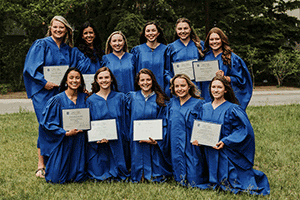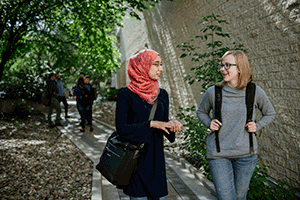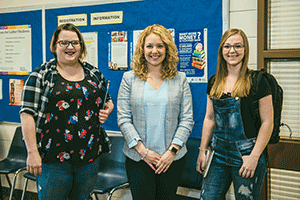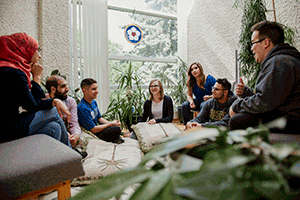Ready to learn more?
Get all the details straight to your inbox!

Luther College students are U of R students and receive all the same benefits. Upon graduation you will receive a U of R degree.

You can book a tour of Luther College, the U of R campus, and our student residence, The Student Village at Luther College, any time throughout the year. Contact our Recruitment Office at 1-306-206-2117.

The priority deadline for academic application is March 15. To book a personalized enrolment counselling appointment, contact our Recruitment Office at 1-306-206-2117.

Living in The Student Village at Luther College, our student residence, comes with a choice of healthy, nutritious meal plans. That means no grocery shopping, no meals to cook, and no dirty dishes to worry about. You can focus on your studies and wellness!

Luther College offers Bundles programs that group together first-year students and classes to give you a great start and help ease the transition from high school to university.

Eating better means studying better. The Luther Cafeteria offers fresh, healthy, nutritious meals seven days a week with a self-serve “all-you-care-to-eat” concept students prefer.

Luther students can register in Arts, Science, or Media, Art, and Performance. Luther students are U of R students and receive a U of R degree.

Luther College appeals to students who want to study in a safe, nurturing, and inclusive environment. We welcome students of all faiths, ethnicities, backgrounds, religions, genders, and sexual orientations.
Get all the details straight to your inbox!
By Jenna Tickell
Senator Lillian Eva Dyck was the 36th Annual Luther Lecturer. Senator Dyck presented her personal story in relation to the issues of racism and sexism in Canada. She began with power-point statistics and ended with a standing ovation from the audience. Her main point pertaining to statistics was to indicate the reality that statistics can be manipulated in various ways, so we must be cautious of what we take as fact from presumably unbiased numbers. When looking at statistics, Senator Dyck reminded us not to get overwhelmed with the notion that maybe some race and gender issues are too big to tackle; for one, because statistics can be manipulated in various ways and truth from numbers is always subjective, and two, that the positive changes that have occurred in Canada regarding gender and race equality should be used to empower us to take the next step. When Senator Dyck began her personal life story, her lecture really blossomed for me. Through telling her life story, she reinforced what I had learned through my university studies while also educating me on a piece of Canadian history that I had not heard before. As a Métis woman and as a university student, the value of guest lectures such as this is immense; she educated me regarding her personal history while at the same time empowered my activism and sense of self-discovery.
Senator Dyck comes from a “mixed” racial family; her mother is Cree and her father is Chinese. Her mother grew up on a reserve where abuse was high and poverty was extreme because of colonialist policies and laws. During the same time period, there was considerable immigration from China, as workers were first needed to build the railway and then were left to find employment, often resulting in local Chinese cafes scattered throughout the small prairie towns in Saskatchewan. Due to restrictive immigration policies, Chinese men were forced to leave their families behind but hoped that one day they would have the financial means to bring them to Canada. Unfortunately, immigration laws became even more restrictive, and this created an interesting phenomenon called the Chinese bachelors. The government allowed their entrepreneurial efforts, but implemented a rule stating that Chinese men could not hire white women to work for them. Chinese men needed waitresses for their small restaurants and since they could not hire white women it opened the opportunity for Aboriginal women to work with and meet Chinese men. Thus, the racist laws actually facilitated “mixed” marriages between Chinese men and Aboriginal women within Saskatchewan.
Senator Dyck’s story began with her mother’s and auntie’s dreams of escaping from the reserve in order to be safe themselves and to create a safe atmosphere for future children. Yet, the law of the land was that if Aboriginal women married non-Aboriginal men, they lost their Indian status and were no longer able to live on the reserves. At this time, most Aboriginal women perceived this to be a positive consequence. By denying their Aboriginal identity and claiming their new Chinese identity, they were exposed to less racism from society as a whole and they could escape the abuse and poverty present on the reserves. Senator Dyck's mother and aunt found their dreams of a better life when they married Chinese bachelors.
Her mother’s decision affected Senator Dyck’s life in numerous ways. By taking on the Chinese name and identity, they all cut ties with their Aboriginal relatives. To this day, Senator Dyck is still piecing together her family stories and lost relatives. Perhaps even more profoundly, before her mother died she told her two things that resonated with her for life: “pretend you’re Chinese,” and “don’t go back to the Reserve.” Senator Dyck did not feel comfortable or safe in exposing her “Cree self” until she was thirty-six years old. When she did finally choose to reclaim her Aboriginal identity, Senator Dyck recounted an overwhelming sense of relief. Finally, after years of secrecy, she was able to start working on her sense of self: she claimed her heritage as a Cree-Chinese-Canadian-Woman. While freedom for her mother was found through a denial of her Aboriginal heritage, for Senator Dyck and our current generation, a reclamation of Aboriginal history, languages, teachings and practices is part of the decolonization process.
The origin of mixed Aboriginal and Chinese ethnicities within Saskatchewan is an important piece of undisclosed Canadian history. I am so grateful to be able to learn about Senator Dyck’s story. I cannot help but wonder about all the other stories around Saskatchewan regarding this valuable piece of Canadian history. I have told anyone who will listen about her story, and surprisingly the details are new to everyone I have told. How many other people do not know about this part of Canadian history? We need to collect the stories from around Saskatchewan before they are forgotten and lost, in part to preserve our history but also to help ourselves as a nation understand patterns of oppression both legislative and implicit.
Senator Dyck lived a great part of her life hiding and being ashamed of part of her identity, and she realized that her personal story echoed the racism and discrimination that is still very much present today. For instance, she recounted evidence from brain scans performed at Harvard University that displayed brain activities that reflect racial biases. Although there have been laws implemented to prevent discriminating acts within society, this study shows that implicit biases are still present. It is the active stereotyping within society that inhibits mixed race individuals from gaining a proud sense of self worth. Legislation alone is not going to change behaviour.
Her lecture left me considering our efforts to redress discrimination. Senator Dyck says that change comes through education. I think to truly make a positive change pertaining to the present discriminations within society we have to start with our children. I am Métis and it took me until I was twenty-three, after a couple years of university education, to take on this identity with pride. I am writing my honours paper in Women’s and Gender Studies, and in it I am including the common phenomenon of the absent identity amongst mixed race Aboriginals. I believe this is occurring in part because we are not being sufficiently educated about our Aboriginal Canadian history, both pre-and-post-colonial. Like Senator Dyck, I was taught through enculturation to pretend I was a tanned white girl and to hide my Aboriginal identity. I was ashamed of my Métis heritage because of the negative stereotypes associated with Indians. While it is good that I’ve learned differently in university, why couldn’t I have learned this earlier in elementary school? What do we learn in school that moves beyond a nice “Indian” day of bannock and a powwow? Can we teach stories like Senator Dyck’s as part of our history curriculum, not just in core community neighbourhood schools but across the whole educational system? A more telling question might be, why wouldn’t we include this? Anti-oppressive education and specifically Indigenous and Metis stories told to young children throughout their education will diminish present stereotypes within our own minds before they have time to flourish in the minds of our future generations. Perhaps it won’t take our kids until they’re thirty-six or twenty-three to proudly and safely claim their Aboriginal heritage.